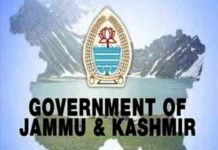Iftikhar Gilani
Frustrated with directions and lost at a busy junction in Bangkok, a Thai tourism kiosk on the pavement came to my rescue. After greetings, the fat manager holding arms with a ‘disturbingly’ beautiful Thai lady wanted to know which part of India I belonged to. Kashmir, as I muttered, they both garbled, oh, Pashmina, Pashmina! Yes, first time, anywhere in the world, I saw somebody recognizing Kashmir not with the conflict or violence, but by its artefacts.
More was in store later as I found my way to Thailand’s Chatuachat shopping market. A retailer, after knowing I was a Kashmiri, jumbled something in Thai to his colleague, who politely asked me to follow circuitous lanes and by-lanes ending up at a big shop. I was confused, till they threw a heap of Pashmina shawls and in broken English asked me to verify if these were genuine. I lamented at my knowledge of Pashmina except with a faint idea that back home I had seen people lighting a matchstick to verify unadulterated shawls.
Known also as Asia’s pleasure capital, Bangkok is always full of cash rich Arabs and mostly aged westerners in search of one-night stands. In true marketing style, the up market Nanauna area has massage parlours named Asrar-ul-Hayat (secrets of life), Asrar-ul-Jism (secrets of body) and Ramooz-e-Badan (mysteries of body). Some parlours even specialize in particular type of massage, like foot massage, hand massage, head massage and some in body massage. In some parlours, I was told, behind the doors the girls rub their own oiled body against the guest’.
During the day Bangkok is any other Asian city, demure and assiduous, but as the night falls the city comes full with life, glitz and glamour dominating the streets. Even a road side bar on a handcart has few girls waiting to serve customers. Big watering holes lure customers with one-liners like ‘Please Step in, our girls and Lonely’.
Elite seasoned girls often act as freelance stalkers hunting for clients in the hot-spots of Bangkok. By all odds, as a tourist in my hotel put it, Thai ladies have their own intuitively marvellous ways to man’s heart. That’s why in Thailand foreigners, young or aged, alike are rarely seen unattended.
Bangkok was founded in 1782 by the first monarch of the present Chakri dynasty. It is now the country’s spiritual, cultural, diplomatic, commercial and educational hub. It covers an area of more than 1,500 square kilometres, and is home to approximately ten million people or more than 10 per cent of the country’s population.
Over the last few decades, Bangkok has changed into a modern, exciting and sophisticated city. Thailand, in the heart of Southeast Asia, was never colonised and thus kept its unique culture and heritage intact. Therefore, the city has had astounding success in combining the ancient and modern world.
The city is dotted with 400 glittering Buddhist temples and more than 100 mosques, magnificent palaces, shopping centres and traditional ways of life. Like in Srinagar, which once housed Nallah Maar, the city has numerous canals with people living on their sides. The mighty Chao Phraya River or the “River of Kings” winds through the city.
Khlong Bang Luang Mosque and Ton Son Mosque are artistic delights. The official Muslim population of Bangkok is 262,023 people but some estimate the number to be closer to one million. Over 160 officially registered mosques are located in the city. Many Muslims live along canals which were historically important transportation corridors (there were few or no roads into many areas until 30 years ago).
But, things do not seem so rosy for Muslims. Like all over world, the 9/11 attacks and particularly the 2002 Bali bombings in nearby Indonesia have changed their lives. “We feel piercing eyes looking at us with suspicion even after having spent the major part of our lives here,” says Akbar Ahmed, a Pakistani expatriate, now a Thai national. He is living in Bangkok for past 40 years.
Asia’s eastern region may seem composed in comparison to Afghanistan, Pakistan, Kashmir and Iraq, but Muslim-dominated provinces in three countries – Arakan in Myanmar, Mindanao in the Philippines and the southern provinces of Yala, Narathiwat, Patani and Satun in Thailand – are reeling under insurgencies and daily rounds of gun-battles and bombings.
In all three conflict zones, millions have been killed, displaced and made refugees either in their own countries or other countries. Generations of Rohingyas, Moros and South Thai Malays have been witness to violence, deprivation and tragedy.
Like India, these governments – exploiting the war on terror – have, of late, sold these conflicts as part of terrorism and hardline Islamism, seeking sympathies and aid from the West.
The executive director of Penag-based Citizens’ International, Mohideen Abdul Kader, told this writer that these conflicts – raging on for several years without any resolution – involve the right of self-determination to indigenous communities. He also pointed out that unless the conflicts are tackled and redressed effectively and justly, the worsening spread of their impact could spill over national borders.
Last fortnight, 200 Thai security personnel raided an Islamic school in the southern part of the country, detaining 60 students and religious teachers for questioning. At least 4,000 killings have been reported in the region since 2004. The emergency laws imposed in the region in July 2005 authorise military to detain suspects for interrogation for 30 days without charge. The raid came two days after a group of suspected Muslim insurgents opened fire on a high-ranking civil servant’s motorcade in the area.
But in these areas too, insurgents have killed more fellow Muslims than rival Buddhists or security forces. They killed a 49-year-old Muslim cattle farmer and a butcher on suspicion of being informers. A tailor’s shop was bombed for selling police uniforms.
Recently, insurgents killed a former 60-year old guerrilla leader, Waedolah Wae-u-Seng, along with his daughter, son-in-law and two grandchildren. The teacher-turned-leader had abandoned guns and mellowed down as a politician.
As I was leaving Thailand, reports from Southern Yala provinces said soldiers have take up position in a marsh in a joint operation with police to flush out suspected insurgent leader Nurisan Wani along with his group hiding near Batan Mountain in Muang district. The news sounds familiar. We have it in abundance in Kashmir. It was another anomaly with my homeland besides Pashmina!















